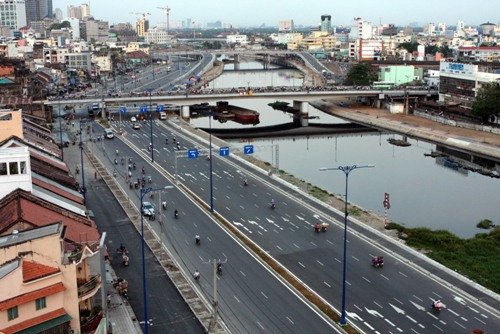The Vietnamese government need to work together with private sector importers, exporters and transport companies to improve freight logistics if the Southeast Asian country is to maintain its current rate of growth, according to the World Bank report released last week.
Titled “Engaging the Private Sector in Transport and Logistics Planning and Policy Making: Options for Vietnam,” the report recommends "systematic engagement with freight stakeholders by government agencies responsible for planning and policymaking in order to boost trade competitiveness."
Vietnam’s evolving economy needs new strategies to maintain its strong growth, said the report, published on the World Bank website last Friday.
The Vietnamese economy expanded by 6.68 percent last year, the fastest growth in the last five years, and has been projected to grow by 6.8 percent this year.
International experience has shown that private sector stakeholders, who are the end-users of transport infrastructure and the key intended beneficiaries of public policies aimed at facilitating trade and reducing logistics costs, are well-positioned to inform public sector decision-makers of matching supply to demand in transport and logistics, according to the report.
The report explains that private sector stakeholders in Vietnam remain relatively untapped as a source of insight into transport and logistics policymaking and planning.
“By more explicitly, transparently, and predictably engaging with private sector stakeholders all across the import-export and domestic supply chain, national and municipal agencies, including the Ministry of Transport and its local arms, can better equip Vietnam with the logistics systems it needs as it enters its next phase of trade competitiveness as a middle-income country,” said Luis C. Blancas, a World Bank Senior Transport Specialist and author of the report.
Malaysia, Thailand, the U.S. and the United Kingdom, which are among the world’s top-performing countries in terms of transport and logistics according to the World Bank’s Logistics Performance Index, have considerable experience in engaging private sector stakeholders in planning and policymaking to assist public sector agencies support strong logistics outcomes, he said.
Such experience elsewhere provides valuable lessons including pitfalls to avoid in Vietnam, Luis said.
In the past, private sector freight stakeholders in Vietnam have worked with government agencies on efforts to facilitate trade only, rather than longer-term aspects including infrastructure planning and policymaking that promotes desirable sector-wide outcomes such as better service delivery, healthier market competition and reducing greenhouse gas emissions that cause climate change, Luis added.
Increased public-private engagement can greatly enhance logistics competitiveness in those areas going forward, according to the report.
The paper also suggests establishing legal frameworks for public-private and public-public collaboration, and furnishing such partnerships with sufficient resources to carry out their mandate.
Other important steps include managing private sector expectations, ensuring comprehensive representation of stakeholders across the supply chain, and observing common-sense “business meeting” norms regarding timeliness and the prompt issuance of minutes with clearly assigned responsibilities and well-defined actions, said the report.
In addition, the report calls for private sector engagement opportunities throughout the planning and policymaking cycle, as opposed to within only selected sections of it, as a contributing factor to ensuring sustained engagement.
A survey of Vietnam’s private sector freight stakeholders confirmed an unmet need for greater engagement between the government and the private sector on planning and policymaking in logistics.
Respondents strongly supported platforms for dialogue and collaboration consistent with the approaches suggested by various international experiences.
Like us on Facebook or follow us on Twitter to get the latest news about Vietnam!





















































